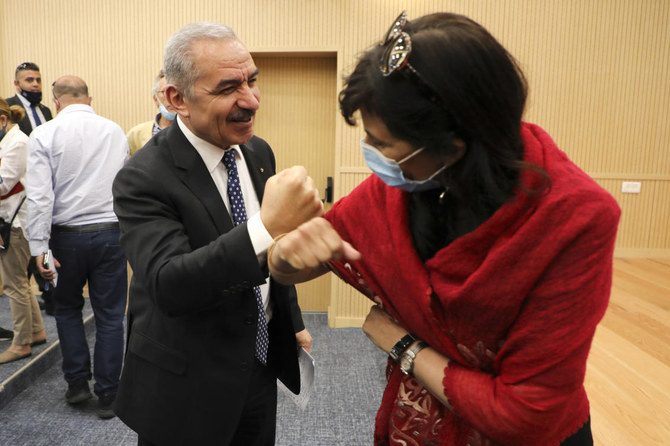
- ARAB NEWS
- 20 Apr 2024

RAMALLAH (Palestinian Territories)
Palestinians have sent top mediators including the United Nations a response to the US plan which anticipates Israel annexing parts of the occupied West Bank, Palestinian premier Mohammed Shtayyeh said Tuesday.
“We submitted a counter-proposal to the Quartet a few days ago,” he said, referring to the group mediating in the conflict, made up of the United Nations, United States, Russia and the European Union.
It proposed the creation of a “sovereign Palestinian state, independent and demilitarised,” Shtayyeh said, with “minor modifications of borders where necessary.”
The Palestinian text foresaw possible land swaps between the two future states on a like-for-like basis, the prime minister said at a press conference.
Announced at the end of January in Washington, US President Donald Trump’s peace plan envisions the annexation by Israel of its settlements and of the Jordan Valley in the West Bank.
More than 450,000 Israelis live in West Bank settlements deemed illegal under international law, alongside 2.7 million Palestinians.
Washington’s proposals provide for the creation of a Palestinian state, but on reduced territory and without Palestinians’s core demand of a capital in east Jerusalem. The plan has been rejected in its entirety by the Palestinians.
The European Union opposes it and is demanding that Israel abandon its annexation ambitions, which it has said it will reveal after July 1.
Analysts say that Israeli Prime Minister Benjamin Netanyahu has a narrow window of opportunity to implement Trump’s deal before the US presidential election in November.
EU member states are weighing options such as economic sanctions or recognition of Palestinian statehood to dissuade Israel from going ahead with the plan, and what measures to take in the event that it is not deterred, diplomatic sources say.
“We want Israel to feel international pressure,” Shtayyeh said in Ramallah, where the Palestinian Authority is based.
“For the first time the European political allies are discussing sanctions against Israel because we asked for them,” he added.
Shtayyeh was speaking a day ahead of German Foreign Minister Heiko Maas traveling to Jerusalem, where he will meet Netanyahu as well as the country’s foreign and defense ministers.
Annexation is expected to be high on the agenda, with Israel intent on toning down Europe’s response to the planned move.
Maas will not travel to Ramallah but is due to hold a video conference with Shtayyeh from the Jordanian capital Amman, where he will meet the country’s Foreign Minister Ayman Safadi.
In recent days, demonstrations against the annexation project have multiplied in the West Bank and also in Israel without, however, drawing large crowds on the Palestinian side.
“The anger is there, the dissatisfaction is there, the frustration is there and all that is a recipe for more problems,” said Shtayyeh.
The premier added that the Palestinian Authority, led by president Mahmud Abbas, wanted to avoid widespread disruption.
An Israeli poll last week showed most Israelis feared that annexation would trigger a Palestinian uprising.
The most recent Palestinian uprising, known as the Second Intifada, erupted in the early 2000s and included waves of suicide bombings and deadly Israeli responses.
AFP